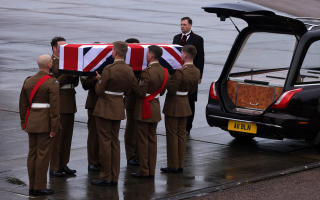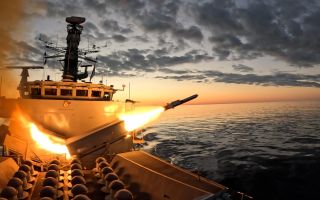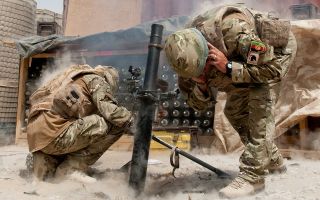Tri-Service
Royal Navy 'Depleted By Vicious Cycle Of Keeping Old Ships'
The Royal Navy fleet is being depleted by a "vicious cycle" of old ships retained beyond their sell-by date, an independent report has warned.
A review headed by Sir John Parker found that the procurement of naval ships takes too long from concept to delivery, compared with other industries.
He concluded that fewer ships than planned are ordered too late, saying:
"Old ships are retained in service well beyond their sell-by date with all the attendant high costs of so doing. This vicious cycle is depleting the RN fleet and unnecessarily costing the taxpayer. It needs to be broken."
Sir John, chairman of mining giant Anglo American, said there is a "vibrant" UK shipbuilding, marine and defence supply chain sector which the Ministry of Defence (MoD) should harness.
He called for a "sea change", with "pace and grip" from the government so that shipyards across the UK can win work and create jobs.
He said the government must drive cultural change in defence to inject "genuine pace" into the procurement process and get a clear grip over cost and time.
The MoD should lay out its plans for naval ships over the next 30 years, the report recommended.
First Sea Lord, Admiral Sir Philip Jones, told Forces TV's James Hirst he is in support of the plan.
Welcoming the report on behalf of the government, Defence Secretary Sir Michael Fallon said:
"I would like to thank Sir John for providing an ambitious vision of naval shipbuilding in the UK based on a new era of cooperation as part of our modern industrial strategy."
"This report will inform our National Shipbuilding Strategy to match the needs of the Royal Navy with the ability to design and build efficiently, maintain skills, and maximise export opportunities.
"This will ensure a strong naval shipbuilding sector and help deliver an economy that works for everyone."
The government will publish a formal response in spring 2017.
Sir John Parker carried out the review of Royal Navy shipbuilding to examine how the industry could be kept sustainable in Britain whilst increasing exports.
The report recommended that work on UK warships should be shared between companies around the country.
Sir John says building a new fleet of Type 31 frigates (CGI image above) in a "competitive way" - by distributing work across the UK - would cut construction time and spread prosperity.
He said BAE Systems should build the Type 26 series, describing the defence giant as having the breadth of technical and engineering talent and the most recent experience of building sophisticated warships.
But he added that a new fleet of Type 31 naval frigates was urgently needed to maintain the Royal Navy's fleet numbers and to establish a UK exportable light frigate. He said:
"There is no precedent for building two 'first class' RN frigates in one location."
A separate lead shipyard or alliance would appear to be the best way forward for the new frigate to minimise risk, the report said.
MoD figures estimate that the government spent around £1.4 billion on shipbuilding and repair in the 2014-15 financial year, of which approximately 96% was spent with five UK prime contractors.
Around 15,000 people are directly employed in UK shipbuilding and repair, with an additional 10,000 jobs indirectly supported through the wider supply chain.
SNP defence spokesman Brendan O'Hara said the UK Government must now end "unnecessary and worrying delays" in bringing forward a national shipbuilding strategy.
''The MoD told us the strategy - vital to our shipbuilding industry - would be complete by the Autumn Statement last week at the latest. We are now told it will be spring next year before we can see any firm plans and that means more unnecessary and worrying delays for the workers, families and communities that depend on shipbuilding".
"These concerns about another Westminster muddle will only be heightened by some of the recommendations in this report, with clear implications for yards on the Clyde in particular.
''Today's report is a distraction for shipyards and shipbuilding in Scotland, who deserve better than this."
In a statement before the report's publication, Sir Michael described it as a "balanced critique" and "thorough analysis" of the challenges faced by government and industry in the naval shipbuilding sector in recent years.
He added that the National Shipbuilding Strategy will take the report and its recommendations into account, and that "we must use the opportunities that Brexit provides to become a global trading power again".
HMS Daring, one of Britain's six Type 45 destroyers
It comes after an influential House of Commons committee warned last week that uncertainty over plans to replace the "pathetically low" number of British warships risks jeopardising the country's defences.
The Defence Select Committee said dropping below the current 19 ships even for a short time would be "completely unacceptable" and leave the UK lacking the maritime strength to deal with the threats it faces from areas like Russia.
Earlier this month, meanwhile, the Ministry of Defence (MoD) announced that work to build eight Type 26 frigates on the Clyde will begin in the summer of next year.
It's not yet been confirmed whether eight smaller, general purpose Type 31 frigates will be built there, however.
Cover image shows HMS Argyll, the oldest serving Royal Navy frigate











